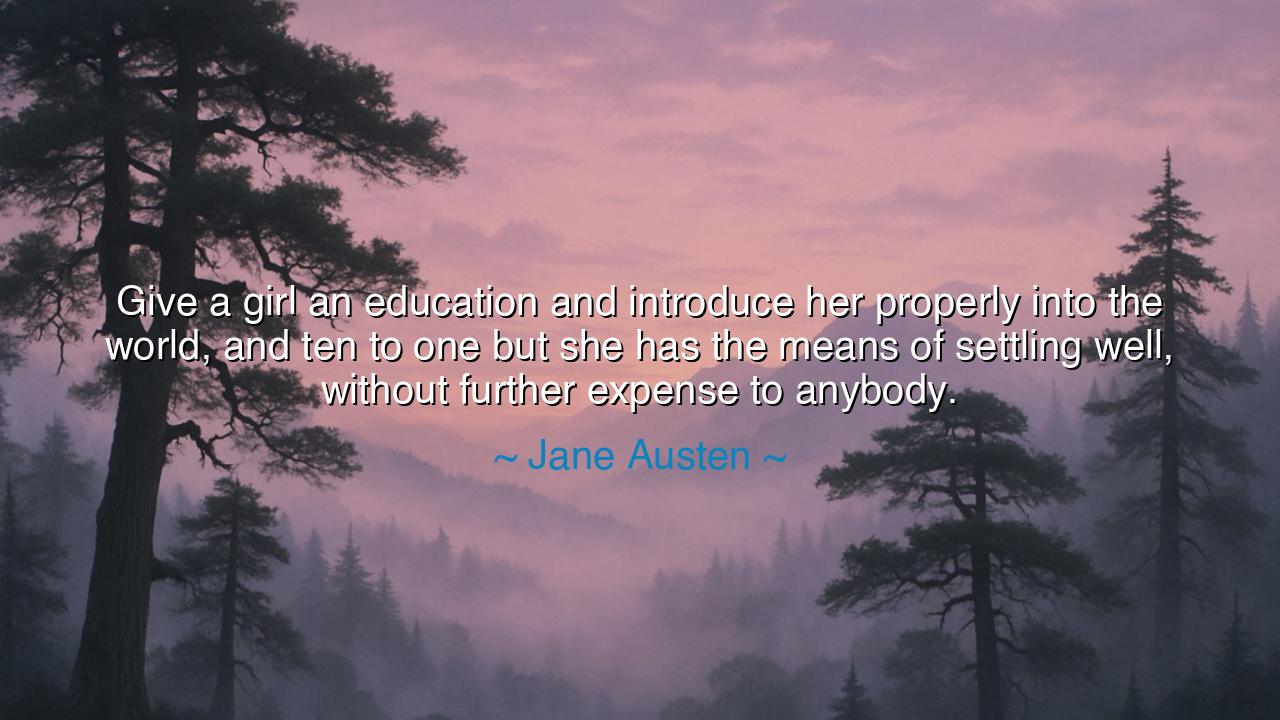
Give a girl an education and introduce her properly into the
Give a girl an education and introduce her properly into the world, and ten to one but she has the means of settling well, without further expense to anybody.






In the wise and timeless words of Jane Austen, “Give a girl an education and introduce her properly into the world, and ten to one but she has the means of settling well, without further expense to anybody.” These words, though wrapped in the elegance of the 18th century, echo a truth that resounds across the ages — that education is the greatest inheritance a woman can receive, and the surest path to independence and dignity. Austen, whose pen unveiled the subtle hypocrisies and quiet struggles of her society, spoke not from theory, but from deep understanding. For she lived in a time when a woman’s fortune was measured not by her wisdom, but by the wealth or rank of the man she could marry. Yet in this one sentence, Austen overturns that notion entirely. She declares that the true treasure of a woman is her mind, and the power of that mind to shape her destiny.
The origin of this quote rests in the world Austen knew — Regency England, a society bound by hierarchy and restrained by custom. Women of her class were often denied higher education, taught only the refinements of drawing rooms: music, embroidery, manners, and modesty. Their futures were not their own to command. Yet Austen saw clearly that such a system was unjust and wasteful. A woman, she knew, was no lesser creature, but simply one whom society had chosen not to arm with knowledge. And so she spoke with quiet rebellion: if a girl is given education and introduced “properly into the world” — that is, if she is taught both wisdom and discernment — she will not depend on the charity of others. She will have within herself the means of settling well, of living securely, honorably, and with self-respect.
To understand the power of her words, we must remember how revolutionary they were. In an age when women could not vote, could not hold property once married, and were excluded from the great universities, Austen’s belief in education for women was radical. But it was also practical. She did not argue for rebellion or upheaval; she simply saw that an educated woman is not a burden, but a blessing — to her family, her community, and herself. Knowledge, she implied, grants a woman not only intellect but agency — the ability to act with purpose, to make wise choices, and to stand firm in the face of life’s trials.
Consider the real-life example of Mary Wollstonecraft, a woman just a few decades before Austen, who dared to write A Vindication of the Rights of Woman. She, too, declared that education was the key to a woman’s independence. Born poor and often scorned, she taught herself by candlelight, worked as a governess, and became one of the first to argue that women’s souls and minds are as capable as men’s. Through sheer learning and conviction, she rose above her circumstances, proving the truth of Austen’s words — that when a woman’s mind is cultivated, she needs no savior but her own wisdom and will.
Austen’s quote also carries within it a note of compassion and practicality. She understood that society often viewed women as dependents — first on their fathers, then their husbands. But by educating a girl, she argued, one gives her the means to stand upon her own feet, to live without being a burden “to anybody.” This was not merely a call for fairness; it was a call for responsibility — a recognition that an enlightened society must invest in the education of all its children, not only its sons. For when women are empowered with knowledge, they enrich not only their own lives but the lives of those around them.
History has proven her right. From Florence Nightingale, who transformed nursing through study and discipline, to Marie Curie, who mastered the mysteries of radiation through tireless research, women who were given education became forces of progress, innovation, and compassion. Each began as Austen envisioned — as a girl whose mind was awakened to possibility. And once awakened, such a mind cannot be contained; it spreads light wherever it goes. This, then, is the “settling well” Austen spoke of — not merely financial security, but a deeper peace: the harmony that comes when a person lives by her own strength and wisdom.
The lesson of Austen’s words is as urgent today as it was in her time. If we would build a just and thriving world, we must educate every girl — not as an act of charity, but of justice. For every child, regardless of gender, holds within them the potential to transform their world. Parents, teachers, and leaders must therefore nurture that potential, guiding it with care and trust. To deny education is to deny destiny itself; to grant it is to unleash the boundless power of the human spirit.
So let the voice of Jane Austen echo through the centuries as both wisdom and warning: that the greatest gift we can give a girl is not wealth, nor favor, nor protection, but education — the key that unlocks every door. For once she has learned, once she has been “introduced properly into the world,” she carries within her the tools to build her own life, to uplift others, and to leave her mark upon eternity. In this truth lies the seed of every civilization’s progress — that through education, freedom takes root, and through freedom, the world is renewed.






AAdministratorAdministrator
Welcome, honored guests. Please leave a comment, we will respond soon